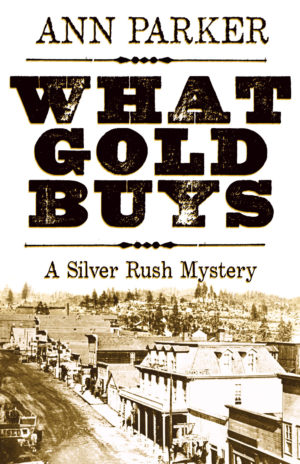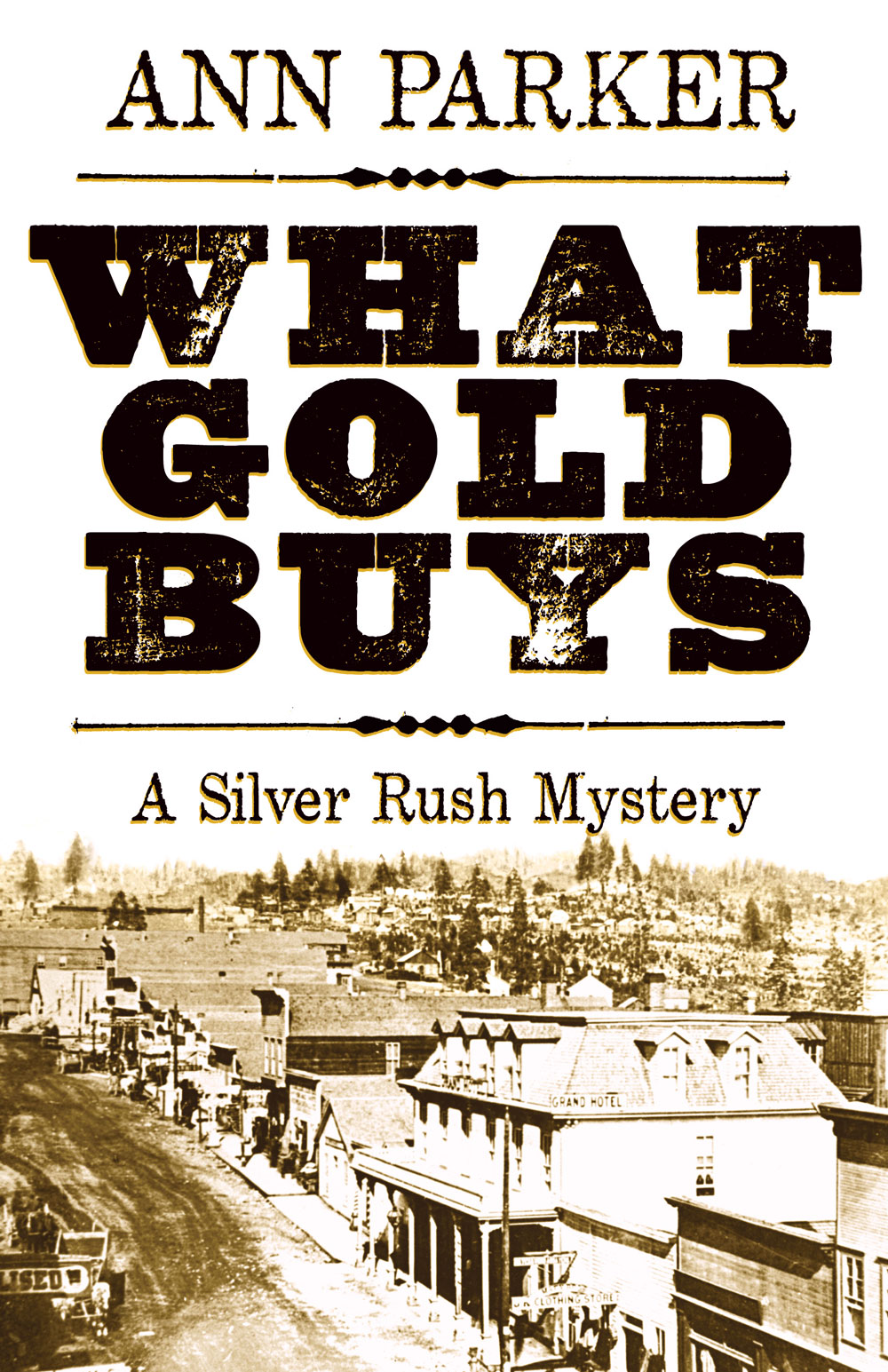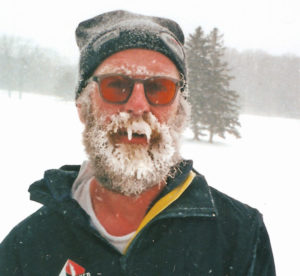 Autumn 1880 in the Rocky Mountains brings frost, snow and the return of Silver Queen Saloon owner Inez Stannert to Leadville, Colorado, in What Gold Buys, the fifth of Ann Parker’s Silver Rush historical mystery series.
Autumn 1880 in the Rocky Mountains brings frost, snow and the return of Silver Queen Saloon owner Inez Stannert to Leadville, Colorado, in What Gold Buys, the fifth of Ann Parker’s Silver Rush historical mystery series.
In this silver rush boomtown, those who are hungry for material riches seek their fortunes in precious metals while others, hungry for spiritual relief, seek to pierce the veil between life and death with the help of fortune-tellers, mediums and occultists. Deep in the twisted byways of Leadville’s Stillborn Alley, soothsayer Drina Gizzi is found murdered, strangled with a set of silver and gold corset laces. No one seems to care except the three who find her body – Inez, Inez’s lover Reverend Sands, and Drina’s young daughter, Antonia. As Inez and Antonia band together to seek out Drina’s killer, they unearth disturbing evidence of underground resurrectionists, long-held grievances, and white-hot revenge. Meanwhile, Inez’s husband, Mark Stannert, true to his word that he only “plays to win,” contrives to drive Inez and Sands apart, gambling that he can convince her to abandon her plans for divorce.
What Gold Buys garnered a starred review from Publishers Weekly, which described it as “emotionally and historically convincing.” The Silver Rush series was picked as a “Booksellers Favorite” by the Mountains and Plains Independent Booksellers Association, and other books in the series have won various awards, including the Colorado Book Award, the Willa Literary Award for Best Historical Fiction, and the Bruce Alexander Memorial Historical Mystery Award. In series order, the books are: Silver Lies, Iron Ties, Leaden Skies, Mercury’s Rise, and the latest, What Gold Buys, which will be released this September.
For more information, see Ann Parker’s website, www.annparker.net.
From What Gold Buys: Chapter Two
Inez Stannert paused in the process of disembarking from the passenger car at Leadville’s Denver & Rio Grande station, one gloved hand gripping the hold bar, one foot planted on the step, and surveyed the scene. A tide of people poured out of the depot toward the train, pushing and jostling against a river of arrivals who pushed in the other direction.
Beyond them, the haze from coal- and wood-fired commerce blanketed the town. The miasma thickened to the east, shrouding the mining district that covered the rolling terrain below the Mosquito Range. A faint smell of new-hewn timber, still seeping from the station hastily erected the previous month, tickled her nose and mixed with the dust churned up from rutted thoroughfares by thousands of wheels, boots, and hooves. The noise of the train station rang in her ears – the sighs and clanks of the engine at rest, the rumble of carts full and empty rolling this way and that, passengers shouting to be heard above the racket, and the laughter of “well met!” greetings.
The familiar sights, smells, and sounds of the silver rush boomtown that was Leadville enveloped her. It was a place of constant movement, shifting dreams and phantom schemes. Of silver wealth, pulled from underground by backbreaking work and tenacity, wealth that poured easily into the pockets of the silver barons, and squeezed to a grudging trickle for those whose hands brought it to the surface, to the stamp mills, and to the railroad for transport. The profits pulled from that mineral river also fed the businesses of the town, much of it finding its way to State Street businesses of entertainment, ease, and ill-repute.
This was Leadville.
A home where fortunes were made and lost, often at dizzying speed. Where dreams were created and destroyed, sometimes in a toss of the dice or an assay of a claim. Where life could be snuffed out with cruel suddenness, in the dark of an alley, in the depth of a shaft, in the dusk of opium, morphine, or alcohol… or in the pain of childbirth. Leadville. It pulsed with energy, with drive, with purpose.
It was a mountain metropolis. Colorado’s City in the Clouds.
It was – Inez took a deep breath, and filled her eyes and ears yet again – it was home.
As she allowed the familiar symphony of sights and sounds to settle over her, she detected a faint, discordant note. She cocked her head, still, listening intently. That sounded like …
Then again.
A shot. Distant. Not a rifle, most likely a revolver.
And again.
Well spaced. Deliberate.
She looked down at her husband, Mark Stannert, who had stepped off first, and was holding out his hand, patiently, waiting to help her descend.
“Did you hear that?”
“Hear what, darlin’?”
“Gunshots.”
Mark glanced around the chaos of the station, giving the cacophony of people, animals, and machinery time to sink in.
A volley of shots boomed out, punctured by energetic hoots and hollers from the far end of the platform. People scattered away from the vicinity, leaving a clear view of a clutch of men, guns being reholstered, slapping one of their own on the back, then hoisting him into the air and bearing him away, with raucous cheers. “Sounds like someone’s train’s come in, in more ways than one,” observed Mark. “Let’s hope they stop by the saloon to celebrate.”
“I know what I heard, and that wasn’t it. Three shots. Deliberately spaced.” She looked at Mark, who had removed his sober-as-a-judge black bowler and was knocking the travel dust from it. “Whatever happened to that ordinance forbidding the discharge of pistols within town limits?”
He shrugged. “It’s not as if someone shootin’ a gun is an unusual happenstance, even in town.”
Inez shook her head, annoyed at herself, annoyed that the three even shots lingered inside her mind like an insistent echo.
Letting her gaze wander the forward length of the train, she saw that the outward flow of disembarking travelers had slowed to a trickle. Those impatient to board pushed in the other direction, maneuvering onto the train. Toward the rear, the baggage porters who had just finished emptying the cars were now busy dealing with an inward flux of boxes, trunks, crates, and mail bags.
A carriage, draped all in black and pulled by two black horses topped with black head-plumes, advanced slowly toward a baggage car hitched two cars down from where Inez stood. A pathway opened up as if by magic as the funeral coach moved up alongside the sliding doors. Two somber-faced black-coated men, black crepe armbands visible over the sleeves of their coats, clambered out of the back. Up front, another man, dressed in a formal frock coat of similar midnight hue, looked around briefly, his eyeglasses catching a brief flash from the sun. He removed his bowler to dab at his high square forehead with a handkerchief, before replacing his hat. He climbed down from the funeral coach and walked to the baggage car to talk to the handlers, who had whipped off their peaked caps in deference to the departed. The driver remained in place, holding the horses steady as the handlers jumped out of the car and began sliding the coffin from the back of the carriage under the direction of the man in charge, who Inez surmised was the undertaker.
Inez lingered on the top step, mesmerized by the sight of some soul departing for the last time from Leadville. “No more dreams and schemes for that one,” she said, half to herself. As if in agreement with Inez’s assessment, the sun flashed off the sides and top of the coffin, just as it had from the undertaker’s spectacles. It was, she realized, a metal casket, polished to a high, mirror-like shine, with gleaming gold fittings.
Inez noted the dearth of mourners: the two men who had accompanied the funeral coach appeared to be the only ones who were present to see the dearly departed on this final journey. They stood, hats removed, heads bowed. From their appearance, she surmised they were young, still approaching their prime, as opposed to the undertaker whose dark beard and hair was shot with silvery undertones. Perhaps they are here to say farewell to a friend, a business partner. Someone wealthy, but new to town, and felled by violence or disease. Called home by grieving family on the sunrise side of the continent, or even over the ocean.
Mark turned to look at what had captured Inez’s attention.
He shook his head, said, “I’m guessing no one we know. Those fellows don’t look familiar to me. New to town, maybe, and one of them met with misfortune. So many, they come and they go, one way or another, right, darlin’?” The funeral carriage pulled away with a squeak and a rattle, to be replaced by the next of several baggage wagons, anxious to disgorge their own contents.



